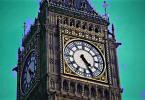
Day two of the Conservative party conference has been workmanlike but dull. The 'highlight' was a speech by Shadow Chancellor George Osborne, in which he warmed Tory hearts by saying he wants tax cuts, but not sure when it will be economically viable.
The "row" over tax at this conference has mostly involved old dinosaurs like Norman Tebbit saying the party should promise tax cuts. Everyone else points out that just offering cuts didn't work in 1997, 2001 and 2005, that its nonsense to offer tax relief three years away from an election. As Osborne put it, a Shadow Chancellor cannot deliver tax cuts, only a Chancellor can. Win the election first.
Tebbit should be shut up and discouraged from pouring his bile into the ears of activists. The problem is that he is hugely popular with party members. As is the only man to make Tuesday interesting, Boris Johnson.
Boris got into a bit of hot water at a fringe meeting by having a pop at St Jamie of Oliver.
"I say let people eat what they like. Why shouldn't they push pies through the railings?," he told a meeting, and the media, smelling an actual story from this conference, went mad for it. Boris had to hide in the press office.
But it is other comments that Boris made about the West Lothian question that provide more insight into the party's thinking about Gordon Brown.
In the conference hall the debate was all about fairness and making sure that English people are properly represented, and to stop Scottish MPs voting on matters that only affect England. This is a bit of a winner for the Tories, but Boris laid it all out on the table:
"I have no wish to be disrespectful to the Scots. But it is outrageous that I as an English MP can be outvoted on issues such as Oxfordshire's NHS without corresponding powers the other way.
"The Scots should not get free university education subsidised by us in England. They shouldn't get free nursing care.
"As a Scot Gordon Brown will find it hard to convince people in England he should be prime minister."
As you can see, if the Tories fail to make inroads into Scotland and Wales, they will turn on them and demand a reduction in the amount of subsidy the regions receive from England.
As Boris demonstrates, what starts as a reasonable argument about ensuring English MPs vote on English matters very suddenly leads to a situation where the UK itself is under threat.
It is interesting that the Tories never refer to their 18-year rule over Scotland, where they imposed what they liked in a manner that Edward Longshanks would have been proud. It was their contemptous misrule of Scotland that led directly to demands for the formation of a Scottish parliament.
They claim to be the party of the Union, but then they used to claim to be the party of tax cuts. The Tories could end up causing more division between England and Scotland. If Cameron fails to secure significant gains in the elections for the Scottish parliament elections next year, the Tories are in danger of becoming an English nationalist party.
